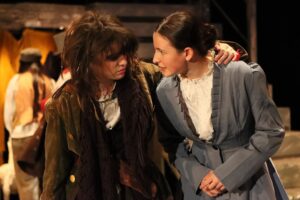From 13 -17 March, KEHS marked its first Neurodiversity Celebration Week, which saw students and staff hear from a number of inspiring speakers.
Upper Fifth student, Lulu, has written a wonderful report on the week’s activities, which can be read below.
Wednesday 15 March
On Wednesday, Simon Jarrett came in to KEHS to deliver a talk on his book, Those They Called Idiots: the idea of the disabled mind from 1700 to the present day. Simon began by explaining the complexities surrounding the language used to describe people we currently refer to as ‘intellectually disabled’, and how this ever-changing terminology is in itself revealing of the evolving perception of these people throughout history. He took us through the changing treatment and position of people with learning disabilities across the centuries, from the broad acceptance of those deemed ‘idiots’ in eighteenth century England, through the ‘Great Incarceration’ of thousands in specially built asylums in the nineteenth century, and finally to the care currently given to people in our communities. Using paintings, cartoons and photographs, Simon illustrated how the view that neurodiversity can be identified through visible physical difference has remained persistent throughout history; ‘idiots’ in the eighteenth century, for example, were commonly believed to have bent legs and a gaping mouth. Concluding his talk, Simon gave examples of both the improvements made for people with learning disabilities following the (relatively recent) closure of mental asylums, and the challenges still posed to them in our modern society. He reminded us that historical perceptions of neurodiverse people still have a profound effect on their current treatment – which is why learning about the past is so vital to making progress now. Thank you to Simon Jarrett for delivering such a fascinating talk, for answering our questions and for bringing to light the history of those still often marginalised from society. KEHS students can borrow a signed copy of Those They Called Idiots from the Senior Library or the Warnock Room.

Thursday 16 March
Tiffany Grego came into KEHS on Thursday to talk to staff and students about her lived experiences as a young autistic female. Having been diagnosed with autism in her late teens, Tiffany discussed a wide variety of topics drawing on her own experiences, from sensory issues and social interactions to representations of neurodiversity in the media and the often problematic stereotypes of autism such TV shows and movies perpetuate. Tiffany’s personal experiences in education stressed the importance of helpful and empathetic support for neurodiverse students in schools. She concluded by reminding us to view autism and neurodiversity not as illnesses to be cured, but rather as strengths, as she gave examples of celebrities, businesspeople, artists and activists who also happen to be autistic. Thank you to Tiffany for an insightful, honest and uplifting talk.

Friday 17 March
Dr Ollis, Mathematics teacher here at KEHS, gave a wonderful talk on Friday about his experiences as a neurodiverse person. Dr Ollis spoke about the challenges he has faced with prosopagnosia (also known as face blindness) and other traits of neurodiversity such as noise sensitivity before discussing practical strategies he has used to manage these challenges both in his previous job as a pilot and as a teacher. Above all, however, he talked about how he views his neurodiversity as a beneficial and integral part of his identity which allows him to be so successful in his career and other interests. It was inspiring for students and staff to hear from a member of staff in our own school community about the life they’ve lived as a neurodiverse person; thank you so much to Dr Ollis for delivering this talk.







